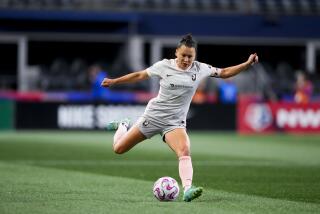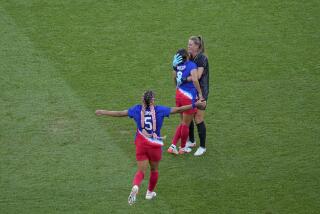The O’Reilly Factor
- Share via
Heather Ann O’Reilly remembers the afternoon only too well.
It was Sunday, Oct. 6, and defending world champion United States was playing Germany in the semifinals of the 2003 Women’s World Cup.
O’Reilly, who but for a broken leg might have been on the field in Portland, Ore., that afternoon, instead was aboard a bus, traveling back to North Carolina from Maryland with the rest of her Tar Heel teammates.
“I was just calling anybody I could to get the play by play,” O’Reilly, 19, said the other day at the Home Depot Center. “It was a good five-hour bus ride. I got to my dormitory when there were about five minutes left, so I saw the last five minutes and I saw the faces of Mia [Hamm] and all the girls after they lost. It was kind of hard for me.”
It was also a far cry from O’Reilly’s experience of four summers earlier.
“In the ’99 Women’s World Cup, I was there for the opener in Giants Stadium [when the U.S. beat Denmark, 3-0, in front of 78,972],” she said. “I was just a little 14-year-old kid coming to watch my idols.
“And, now four years later, I’m watching girls that I know, girls that I’ve run fitness with, ... that I’ve put in all the hard work with, and to see them so upset after that loss was just real tough for me.”
There are those who believe that O’Reilly could have made a difference in the Germany semifinal. Had she been on the field, especially as a late substitute, German goalkeeper Silke Rottenberg and the defenders in front of her might have been stretched a little farther and, just possibly, Germany might not have gained the 3-0 victory en route to its first world championship.
Such second-guessing is pointless, of course, but the fact remains that nine weeks after that match, O’Reilly led North Carolina to its 17th NCAA women’s soccer title. She scored twice in a 6-0 rout of Connecticut in the Dec. 7 final and earned tournament most valuable offensive player honors as the Tar Heels completed a 27-0-0 season.
“It was a good ending to the season,” she said. “I couldn’t have asked for more in my freshman year.”
It was also merely the latest honor for a player whose resume already included winning the first FIFA Under-19 Women’s World Championship with the U.S. in 2002 and being named national high school player of the year that same year while graduating with honors from East Brunswick High in New Jersey.
April Heinrichs, the U.S. women’s national team coach, prefers not to dwell on what might have been, preferring instead to imagine how O’Reilly can contribute in this year’s Athens Olympics.
So Heinrichs dodged the “what if” question: What if O’Reilly had not broken her left leg on June 13, when she scored 74 seconds into her first start for the U.S. but broke her fibula in a collision with Ireland goalkeeper Emma Byrne on the scoring play?
Would she have made the World Cup roster?
“I think looking back is always easy,” Heinrichs said. “In order to have been on the field against Germany, she would have had to do well against Norway. She would have had to get in against Sweden. She would have had to play well against North Korea ...
“She’s certainly a young player who’s very talented. She has the right frame of mind and mentality to be a national team player at such a young age. She’s got wonderful qualities athletically. With our youth national teams program she has a pretty good pedigree for someone who is still just 19. She’s got a lot of experience and she’s unfazed by pressure.”
It was when the U.S. played Brazil in New Orleans in July that Heinrichs told O’Reilly she was not in the coach’s World Cup plans.
“I was pretty devastated about it,” O’Reilly said.
It was the correct decision, however, because a subsequent ankle ligament problem delayed full recovery.
“I think the length of time that it took her to recover is a good indication that we made the right decision to pick someone other than her,” Heinrichs said. “It wasn’t until mid to late November that I was getting reports that O’Reilly was really 100%.”
O’Reilly and Heinrichs have North Carolina Coach Anson Dorrance to thank for the player making a full recovery. Dorrance, who coached the U.S. to the 1991 world championship in China, where Heinrichs was one of his stars, took his time with O’Reilly.
“I love it [playing for Dorrance],” O’Reilly said. “I think he’s a great guy, a great coach. I think he’s going to do wonders for me over the next four years.
“He was very patient with me and my injury. He didn’t allow me to become frustrated. What he did was every week he would call me into his office and be like, ‘Heather, do you see how much better you just got this week? Do you see how many steps faster you are? Do you see how your touch is cleaner?’
“All the pieces were coming together and he kept it exciting for me in my rehab.”
O’Reilly, who is in China with the rest of the women’s national team for this week’s Four Nations Cup, said she is at the top of her game.
“I think I’m 100% back,” she said. “All the speed is back.”
Speed, apparently, is in the O’Reilly genes. Her father, Andrew, ran track at Villanova and one of her brothers competes in track and cross-country at the Air Force Academy.
There is quickness and then there is quickness, however, as Heinrichs is quick to point out.
“I think for overall speed, Shannon MacMillan and Mia Hamm can definitely hold their own with Heather O’Reilly’s speed up top,” she said. “Mia’s agility is better than Shannon’s and O’Reilly’s. O’Reilly is more of a straightaway [runner]. So that’s a comparison.”
But where O’Reilly and some of her teammates from the under-19 world championship team -- players such as Lindsay Tarpley and Lori Chalupny -- can help as they are integrated into the senior team, is in their attitude and enthusiasm.
“O’Reilly’s unique because she’s a 19-year-old and we love to kid her and we love her disposition and her spirit for the game and her spirit for working,” Heinrichs said.
“You need to have a 19-year-old who plays with such passion and plays with such unabashed competitiveness with no apologies. That’s what’s so unique about her.”
After the China trip, the U.S. goes to Costa Rica in February for the CONCACAF region Olympic qualifying tournament. Then the team leaves for Portugal and the Algarve Cup in March, after which it will spend three months in residency camp at the Home Depot Center preparing for the Olympics.
O’Reilly can’t wait.
“It’s going to be an exciting few months,” she said. “I’m taking a semester off school and just going to focus on making [the Olympic] team. I want to do my part to get a gold medal back for this team.”






